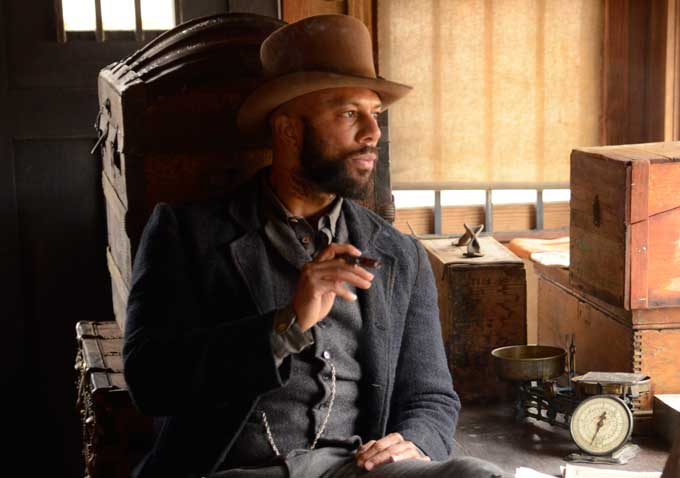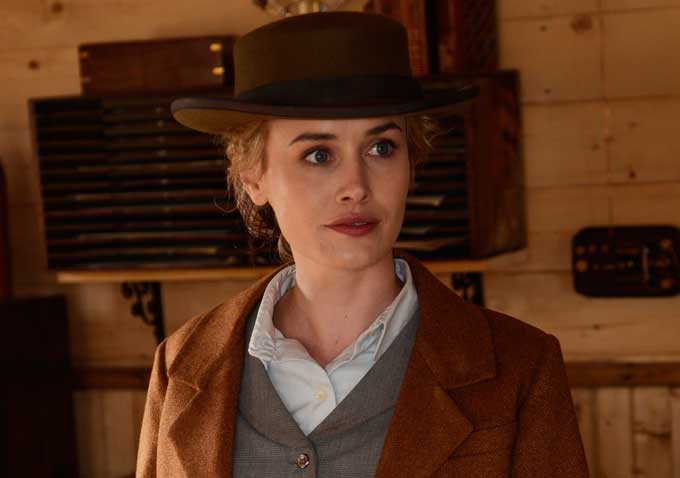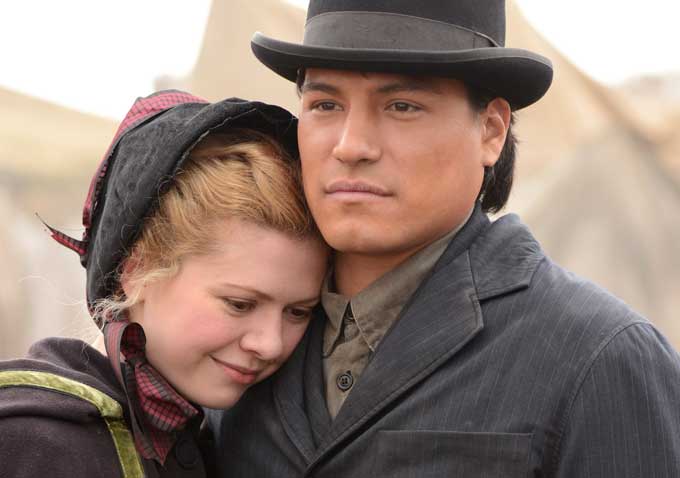By providing your information, you agree to our Terms of Use and our Privacy Policy. We use vendors that may also process your information to help provide our services. This site is protected by reCAPTCHA Enterprise and the Google Privacy Policy and Terms of Service apply.
Is ‘Hell on Wheels’ Worth Adding to Your DVR Line-up in Its New Season?

It should to be said that “Hell on Wheels,” AMC’s Western drama set just after the Civil War and due to return for a second season kicking off this Sunday, August 12th at 9pm, is no “Deadwood.”
In an uneven 10-episode first season that ended in January of this year, the Joe and Tony Gayton-created series repeatedly and helplessly brought to mind David Milch’s dense, brilliant HBO show, in not just its gritty frontier setting but its characters (Cullen Bohannon is a parallel to Seth Bullock; Doc Durant is Al Swearengen; Lily Bell is Alma Garret and Eva is Trixie) and overall vividly dark aura. “Hell on Wheels” can’t compare to “Deadwood,” but then few series can — Milch’s drama managed to show the process of a civilization forming out of chaos, and had a singularly strange and wonderful style of dialogue, balanced violence and distress with moments of incredibly warmth and empathy, and offered several dozen complex, compelling characters you wanted only to spend more time with.
 On the plus side, though, “Hell on Wheels” is no “Deadwood” — you don’t have to plow through several deliberately abrasive episodes in order to get under the show’s rough surface, you don’t need to keep track of a gigantic ensemble cast and there’s no requirement or necessity to start at the beginning to understand what’s going on. In fact, you can pretty easily jump on board the second season, which is something I’d recommend — the first two episodes that were provided to the press demonstrate the marked improvement the series has made since its inception last year, as it slowly becomes a work with its own distinctive voice.
On the plus side, though, “Hell on Wheels” is no “Deadwood” — you don’t have to plow through several deliberately abrasive episodes in order to get under the show’s rough surface, you don’t need to keep track of a gigantic ensemble cast and there’s no requirement or necessity to start at the beginning to understand what’s going on. In fact, you can pretty easily jump on board the second season, which is something I’d recommend — the first two episodes that were provided to the press demonstrate the marked improvement the series has made since its inception last year, as it slowly becomes a work with its own distinctive voice.
In its second season, “Hell on Wheels” seems intent on getting its characters away from the limiting archetypes in which they were first conceived. This is most important to laconic protagonist Cullen Bohannon (Anson Mount), who began the show as a former Confederate soldier (but you know, a nice one, one who freed his slaves of his own accord) devoted to tracking down the Union soldiers who killed his wife and child. Tough as nails and wryly disinterested in what life has to offer outside of his personal quest, Bohannon spent most of the show’s first 10 episodes finding a place for himself on the railroad construction crew out of self-preservation and because it provided a solid perch from which to look for his prey. His need to run off and potentially kill people would endanger his job, but he’d find some way back. His drive for revenge came at the expense of much of a personality, though the world-weary flicker of amusement Mount found in the character always showed the potential for more. “Has anyone ever told you what an insufferable ass you are?” Lily (Dominique McElligott) asks him at one point, and after a beat he replies “Yeah,” and rides away.
 Bohannon begins the second season having fallen very far indeed from his place as Union Pacific foreman, and while the show finds a way to bring him back into the fold, it seems less like a contrivance this time and almost more of a romantic gesture — the railroad town of Hell on Wheels isn’t stable without him, as if he’s somehow took an essential element with him when he left. And the show confronts in his character, as well as in the crumbling, alcoholic Reverend Cole (Tom Noonan) and sallow Thor Gunderson (Christopher Heyerdahl), known in the camp as The Swede and himself demoted to a demeaning but necessary position, a certain innate desire for death and destruction, for throwing in the towel and longing for the end instead of doing the exhausting, endless work of hewing order out of the wilderness.
Bohannon begins the second season having fallen very far indeed from his place as Union Pacific foreman, and while the show finds a way to bring him back into the fold, it seems less like a contrivance this time and almost more of a romantic gesture — the railroad town of Hell on Wheels isn’t stable without him, as if he’s somehow took an essential element with him when he left. And the show confronts in his character, as well as in the crumbling, alcoholic Reverend Cole (Tom Noonan) and sallow Thor Gunderson (Christopher Heyerdahl), known in the camp as The Swede and himself demoted to a demeaning but necessary position, a certain innate desire for death and destruction, for throwing in the towel and longing for the end instead of doing the exhausting, endless work of hewing order out of the wilderness.
But even those devoted to building, we see, have had to make compromises, and in this new season it’s made clear that the widowed Lily who, as Bohannon once put it, has no obvious place out there as she “ain’t whore nor squaw,” has had to get involved in a relationship she firmly vowed to avoid previously — that her desire to be treated as independent and taken seriously comes with a certain price. And Elam Ferguson, the freed slave played by Common, has climbed the ladder at the camp at the expense of his personal relationships, having lost his lover Eva to a man who’s willing to settle down with her, and no longer comfortable enjoying the camaraderie of the other black railway workers now that he’s reporting directly to Durant.
 There’s sometimes been a jarring anachronism to certain attitudes of the characters in “Hell on Wheels” and the way they relate to the positions they’re put in in life — they don’t always behave like people who’ve grown up in the era wth all of its impediments. Elam in particular always seemed, in the first season, inexplicably resentful and surprised when he was treated poorly because of his race, even though he spent the majority of his life around people who felt entitled to look at him as property.
There’s sometimes been a jarring anachronism to certain attitudes of the characters in “Hell on Wheels” and the way they relate to the positions they’re put in in life — they don’t always behave like people who’ve grown up in the era wth all of its impediments. Elam in particular always seemed, in the first season, inexplicably resentful and surprised when he was treated poorly because of his race, even though he spent the majority of his life around people who felt entitled to look at him as property.
The show has been similarly conflicted about its portrayal of Native Americans, with Christian convert Joseph Black Moon (Eddie Spears) manuevering to protect his Cheyenne family from those in the camp who wanted to kill them while also needing to take down his warlike brother, and Cole representing an awfully progressive point of view on the government’s need to make peace with the tribes. But the show now seems ready to challenge those stances, both in its revelations about Lily’s changed relationship with Durant and in how it confronts Cole to prove just how liberal he really is.
There are stylistic anarchronisms to the show as well, most notably its habit of setting long montages to contemporary music. But what initially felt like a tic has come to suit the series as it allows its characters to live and breathe a bit more, and as it seems less a series about The Era of The Building of The Railroads and more one about a group of flawed people carving out lives during a particularly iconic period in our country’s history. A sequence set to The Dead Weather’s “Will There Be Enough Water?” toward the end of this Sunday’s season premiere is, dare I say, a little haunting, as it captures different characters in actions that will surely soon cause them trouble, foremost among them Bohannon himself, who heads into certain danger with his eyes wide open and no thought for cutting and running. “This ain’t going to end well,” someone warns him. “Rarely does,” he responds. And it may not, but I’m on board for the ride.
By providing your information, you agree to our Terms of Use and our Privacy Policy. We use vendors that may also process your information to help provide our services. This site is protected by reCAPTCHA Enterprise and the Google Privacy Policy and Terms of Service apply.

















